Tudway Surname Ancestry ResultsOur indexes 1000-1999 include entries for the spelling 'tudway'. In the period you have requested, we have the following 70 records (displaying 1 to 10): Single Surname Subscription | | | Buying all 70 results of this search individually would cost £362.00. But you can have free access to all 70 records for a year, to view, to save and print, for £100. Save £262.00. More... |
These sample scans are from the original record. You will get scans of the full pages or articles where the surname you searched for has been found. Your web browser may prevent the sample windows from opening; in this case please change your browser settings to allow pop-up windows from this site. Lord Willoughby in the Netherlands
(1580-1601)
Mrs S. C. Lomas of the Historical Manuscripts Commission prepared this calendar of the manuscripts of the Earl of Ancaster preserved at Grimsthorpe, published in 1907. The records covered are from 1550 to 1737, but the bulk of this volume is given over to an edition of the correspondence of Peregrine lord Willoughby, who was appointed governor of Bergen-op-Zoom in 1586, and spent the next ten years commanding English and Dutch forces against those of Spain. There are also a few pages (449 to 452) dealing with a scattering of ancient deeds (from c.1160 to 1547); some items from inventories (452-459, c.1522 to after 1742) and household accounts (459-482, 1560-1661) which attracted Mrs Lomas's attention; and notes from a muster roll of Baberg hundred, Suffolk, of about 1522, from which some names are given in the text.TUDWAY. Cost: £4.00.  | Sample scan, click to enlarge
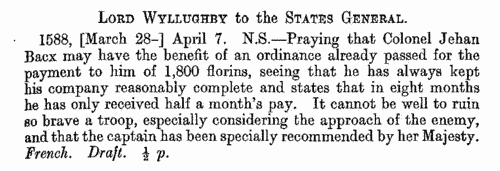
| London Marriage Allegations
(1521-1610)
London, Essex and part of Hertfordshire lay within the diocese of London. In the later 17th century the individual archdeaconry courts issued marriage licences, but for this period the only surviving material is from the overarching London Consistory court. The main series of marriage allegations from the consistory court starts 7 December 1597, and these were extracted by Colonel Joseph Lemuel Chester; Colonel Chester then discovered earlier material, back to 5 January 1521, in Vicar-General's Books of the Principal Probate Registry. The notices in these books were much briefer, but as well as extending back so much earlier, they included additional material for 1597 onwards. All this he collated with the consistory court extracts, and the text was edited by George J. Armytage and published by the Harleian Society in 1887. A typical later entry will give date; name, address and occupation of groom; name, address and condition of his intended bride, and/or, where she is a spinster, her father's name, address and occupation. Lastly we have the name of the church where the wedding was going to take place; or the words Gen. Lic. signifying a general or open licence.TUDWAY. Cost: £4.00.  | Sample scan, click to enlarge

| London Marriage Allegations
(1611-1660)
London, Essex and part of Hertfordshire lay within the diocese of London. In the later 17th century the individual archdeaconry courts issued marriage licences, but for this period the only surviving material is from the overarching London Consistory court. The main series of marriage allegations from the consistory court was extracted by Colonel Joseph Lemuel Chester, and the text was edited by George J. Armytage and published by the Harleian Society in 1887. A typical later entry will give date; name, address and occupation of groom; name, address and condition of his intended bride, and/or, where she is a spinster, her father's name, address and occupation. Lastly we have the name of the church where the wedding was going to take place. For the later years Colonel Chester merely picked out items that he thought were of interest, and his selections continue as late as 1828, but the bulk of the licences abstracted here are from the 17th century.TUDWAY. Cost: £4.00.  | Sample scan, click to enlarge

| Treasury Books
(1689-1692)
Records of the Treasury administration in Britain, America and the colonies.
TUDWAY. Cost: £4.00.  | Sample scan, click to enlarge
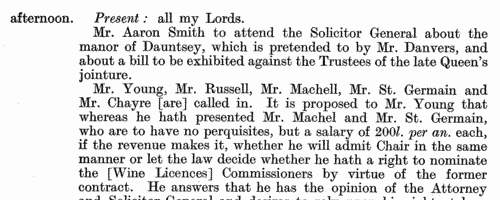
| Allegations for marriages in southern England
(1687-1694)
The province or archbishopric of Canterbury covered all England and Wales except for the northern counties in the four dioceses of the archbishopric of York (York, Durham, Chester and Carlisle). Marriage licences were generally issued by the local dioceses, but above them was the jurisdiction of the archbishop, exercised through his vicar-general. Where the prospective bride and groom were from different dioceses it would be expected that they obtain a licence from the archbishop; in practice, the archbishop residing at Lambeth, and the actual offices of the province being in London, which was itself split into myriad ecclesiastical jurisdictions, and spilled into adjoining dioceses, this facility was particularly resorted to by couples from London and the home counties, although there are quite a few entries referring to parties from further afield. The abstracts of the allegations given here usually state name, address (street in London, or parish), age, and condition of bride and groom; and sometimes the name, address and occupation of the friend or relative filing the allegation. Where parental consent was necessary, a mother's or father's name may be given. The ages shown should be treated with caution; ages above 21 tended to be reduced, doubtless for cosmetic reasons; ages under 21 tended to be increased, particularly to avoid requiring parental consent; a simple statement 'aged 21' may merely mean 'of full age' and indicate any age from 21 upwards. These are merely allegations to obtain licences; although nearly all will have resulted in the issuing of the licence, many licences did not then result in marriage. TUDWAY. Cost: £4.00.  | Sample scan, click to enlarge

| State Papers Domestic
(1702-1703)
The State Papers Domestic cover all manner of business relating to Britain, Ireland and the colonies, conducted in the office of the Secretary of State, as well as other miscellaneous records. 1 March 1702 to 31 May 1703. The calendar was prepared by Robert Pentland Mahaffy, with certain classes of document extracted and placed in separate appendices (called Tables): I, caveats; II, church and university appointments, &c.; III, commissions, warrants for commissions, notes of commissions and notes of warrants for commissions in the English army for 1702; IV, lord lieutenants and deputy lieutenants; V, Irish warrants; VI, weekly lists of ships of the Home Fleet with their stations and orders; VII, passes, notes of passes, post warrants and licences of absence; VIII, orders on petitions; IX, Scottish warrants and commissions; and X, miscellaneous royal warrants (to the Attorney or Solicitor General; in criminal cases; diplomatic; military warrants; miscellaneous warrants; secretary's warrants, allowance of bills, &c.; and notes of warrants for the appointment of almsmen). The source material in the Public Record Office that he drew on in making this compilation is referenced throughout, and is from the State Papers Domestic (and Military, Naval, Signet Office, Various, and Letter Books and Entry Books), State Papers Scotland (Correspondence, Letter Books and Warrants), State Papers Ireland (and King's Letter Books), and State Papers Channel Islands.
TUDWAY. Cost: £4.00.  | Sample scan, click to enlarge
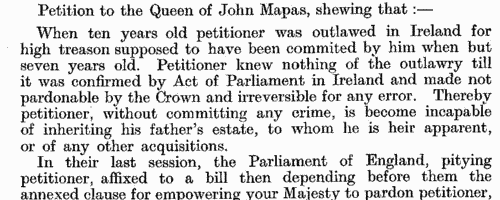
| Boys entering Sherborne School
(1720)
The grammar school at Sherborne in Dorset, which doubtless existed from the creation of the diocese of Sherborne in 705, was refounded by king Edward VI in 1550. At the quatercentenary in 1950, a fourth edition of the Sherborne Register was published, listing boys entering the school during those four centuries. In truth, the materials for this register survive but fitfully before 1823; for some years, no names are known; sometimes all that is known is a surname. But from 1823 onwards the lists and the details get steadily more comprehensive. By the 20th century the boys are listed alphabetically by surname under term of entrance. Surname is given in bold, then christian names, name of father (surname and initials) and address; year of birth; house (a, School House; b, Abbey House; c, The Green; d, Harper House (formerly The Retreat); f, Abbeylands; g, Lyon House; h, Westcott House); whether represented the school at cricket (xi), football (xv), shooting (viii), &c.; year of leaving; summary of degrees, career &c.; and (in italics), address as of 1950. Names in the early lists marked with an asterisk are found inscribed on the oak panelling or on the stone walls of the former schoolroom. (F) in the lists indicates a foundationer, receiving free education: after 1827, when this privilege was restricted to boys from Sherborne and neighbourhood, nearly all foundationers were day-boys.TUDWAY. Cost: £4.00.  | Sample scan, click to enlarge
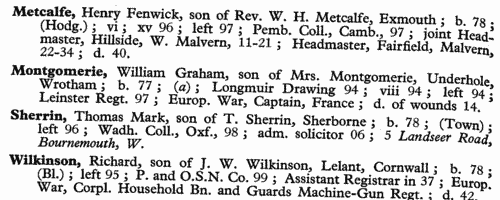
| Correspondence of Matthew Prior
(1685-1721)
Matthew Prior was secretary to the British embassy and minister ad interim at The Hague 1693 to 1697, secretary to the embassy at the Congress of Ryswick in 1697, and secretary to the embassy and minister ad interim at Paris 1698 to 1699. His papers survived among the archives of the Marquis of Bath at Longleat, and were edited for the Historical Manuscripts Commission by J. J. Cartwright, A. Maxwell-Lyte and J. M. Rigg, and published in 1909. The volume concludes with a journal and memoirs relating to the Treaty of Ryswick. Most of the correspondence selected deals with the Anglo-Dutch and Anglo-French diplomacy of the period.TUDWAY. Cost: £4.00.  | Sample scan, click to enlarge
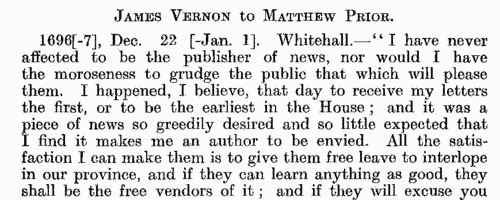
|  Apprentices registered at Gloucester
(1723-1726) Apprentices registered at Gloucester
(1723-1726)
Apprenticeship indentures and clerks' articles were subject to a 6d or 12d per pound stamp duty: the registers of the payments usually give the master's trade, address, and occupation, and the apprentice's father's name and address, as well as details of the date and length of the apprenticeship. There are central registers for collections of the stamp duty in London, as well as returns from collectors in the provinces. These collectors generally received duty just from their own county, but sometimes from further afield. Because of the delay before some collectors made their returns, this register includes indentures and articles from as early as 1722. (The sample entry shown on this scan is taken from a Norfolk return)TUDWAY. Cost: £8.00.  | Sample scan, click to enlarge

| Letters from Oxford
(1710-1729)
Letters from Dr William Stratford of Christ Church, Oxford, to Edward Harley: full of political and personal gossip.TUDWAY. Cost: £4.00.  | Sample scan, click to enlarge
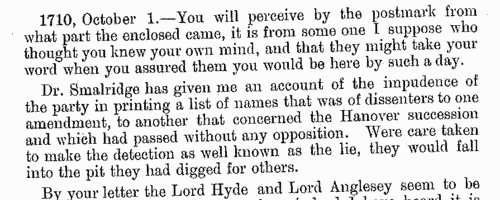
|
Research your ancestry, family history, genealogy and one-name study by direct access to original records and archives indexed by surname.
|













